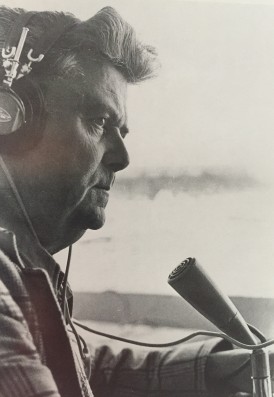Martin Chandler |

As a race, we Yorkshiremen are impolite, boorish, cussed, aggressive, argumentative, disruptive, illiberal and and simply plain downright bloody-minded. We harbour a sequence of complexes starting from inferiority to persecution, and we’re violently resentful of authority in any guise.
A person with the readability of thought to provide you with these phrases, and the honesty to specific them, must be somebody value listening to and Don Mosey aka ‘The Alderman’ was most actually that.
For all of us of a sure age Mosey first got here to our consideration for his work as a commentator on Take a look at Match Particular again within the mid 1970s. He was the one with the commanding presence and barely fearsome voice, tempered by an often impish sense of humour and simply sufficient of an accent to make it clear he was from the Broadacres.
Mosey hailed from Keighley and was a product of what’s now thought-about a bygone age. Strictly introduced up in a family that esteemed the worth of training above all else all three of Mosey and his two youthful brothers secured scholarships to Keighley Grammar College. That a lot mentioned Mosey shone solely at languages, left college at fifteen and went straight into journalism. His Headmaster’s ultimate report on him was, apparently, good however not so good as he thinks he’s.
There was a break in 1941 when, a few years after beginning his profession with the Craven Herald Mosey went into the RAF the place, after coaching as air crew, he travelled the world for 4 and half years, a goodly a part of them spent instructing Indians English within the Iraqi desert. On being demobbed he went straight again to the Craven Herald and continued his progress, shifting onwards and upwards till, in 1959, he turned the Northern Cricket Correspondent of the Each day Mail. A good membership participant within the Wharfedale League himself, Mosey developed robust and lasting friendships inside the omnipotent Yorkshire eleven of the early 1960s.
In 1964 Mosey left the Each day Mail. As my introductory paragraph makes clear he was not a person to endure fools gladly. He left after being incensed over a dispute the place the bean counters have been capable of overrule the artistic minds, and he decamped to BBC Radio and started a brand new profession as Exterior Broadcasts producer for the North of England.
It was 1974 when Mosey joined TMS, and 1978 earlier than, to the very best of my information, he first wrote a e-book, so he was 54. The e-book in query was Brian Shut’s autobiography, I Don’t Bruise Simply. One of many first cricket books I ever learn, I recall completely having fun with the e-book, though I now realize it obtained considerably blended evaluations. Alan Gibson, for a yr a colleague on TMS, reviewed it for The Cricketer and described it as very readable however on the similar time expressed disappointment that it was reasonably a tragic, bitter e-book. I refer again to my opening paragraph! A lot the identical feedback might be made in respect of Mosey’s subsequent writing task, Ray Illingworth’s 1980 autobiography, Yorkshire and Again.
One other collaboration with a Yorkshire nice, Fred Trueman, appeared on the finish of 1982. I’ve not learn My Most Memorable Matches however the humorous cowl and involvement of cartoonist Roy Ulyett recommend it was a extra gentle hearted work than the following Mosey e-book, one other ghosting train, this time John Hampshire’s Household Argument. In Wisden Cricket Month-to-month Simon Wilde put it succinctly when he concluded the e-book was extremely really useful to all those that like a blood-bath with loads of victims and, once more, I refer again to my opening paragraph.
In 1984 Mosey retired from his place with BBC Exterior Broadcasts though he remained with TMS for one more seven years. So far as his writing was involved his solely non-cricket e-book appeared in 1984, though there was a cricketing connection, Fred Trueman’s Yorkshire being concerning the topography of the pair’s beloved county.
The next yr, 1985, Mosey’s title appeared as an creator in his personal proper for the primary time with The Finest Job within the World. The e-book is actually autobiographical concentrating, because the title suggests, on his function with TMS. Very long time colleague Christopher Martin-Jenkins described the e-book as charitable and entertaining. No nice controversy there then, which is one thing that can’t be mentioned of Mosey’s different 1985 e-book, Boycott, a biography of the nice man, and one which was something however authorised. It was not a e-book that discovered favour with its topic who, two years later in his personal autobiography, acknowledged scathingly that Mosey’s e-book was what purports to be an unbiased biography. It’s also the e-book from which my opening paragraph originates.
The truth of the scenario was that Mosey had identified Boycott all through his skilled profession. He had watched him develop, in addition to noticed at shut quarters the nice group he had been part of within the 1960s. On the opposite aspect of the coin he had seen the gradual disintegration of the White Rose, each on and off the sphere, because the 1970s handed into the 1980s and noticed Boycott’s function in that.
The truth is it might appear that till November 1983 the 2 had acquired on effectively, Mosey’s tackle what occurred subsequent is that in a tv interview in November 1983 I had provided the suggestion that Geoffrey was not good in each approach and this had meant the top of a ravishing friendship.
In fact Mosey was in all probability the best individual to put in writing the e-book at the moment (Boycott nonetheless had one season left as a Yorkshire participant). He knew his topic in addition to anybody and, having beforehand labored with Shut, Illingworth and Hampshire, had entry to an enormous quantity of testimony from others who knew his topic equally effectively. The ensuing e-book paid due regard to Boycott’s pre-eminence as a participant, however left no reader in any doubt as to what Mosey perceived to be the failings in his character.
As to how the e-book was obtained it was actually effectively reviewed. In The Cricketer former Glamorgan all-rounder Peter Walker, who would subsequently have ‘had dealings’ with Boycott over a few years, felt that Mosey encapsulated the central core of his topic with uncommon perception. David Frith in Wisden Cricket Month-to-month was somewhat extra guarded and in Wisden John Arlott did his regular deft job of telling his reader what the e-book was about, with out really giving freely what he himself considered his outdated good friend’s work.
Having taken on a mighty problem in 1985 Mosey did the identical once more with Botham in 1986. As soon as extra the state of affairs was a mighty cricketer whose skilled and personal lives each made headlines. Once more Mosey had initially been a great good friend of Botham (in a later e-book he wrote of studying tales to a younger Liam Botham while the teenager was sat on his knee), however the relationship soured. At one level when invited to interview Botham by the BBC Mosey declined to conduct a dialog with that loud-mouthed hooligan.
Right now books with regards to Botham appeared to look each few months, and his momentous deeds have been usually carried out within the full glare of the cameras and reporters. A easy cricketing biography was by no means going to work, and wasn’t what Mosey tried. As with Boycott Mosey in impact took Botham’s on-field achievements as learn, and tried to analyse the character behind them. Inevitable the consequence was not one thing which its topic would have loved studying, and neither of Botham’s autobiographies make any point out of Mosey in any respect.
In some ways it must be mentioned that Mosey’s e-book is a good portrayal of Botham’s faults, and occasionally in analysing these he does apportion blame to components apart from Botham himself. The issue in the end nonetheless, and far the identical might be mentioned of Boycott, is that if the heroics on the pitch are ignored, and likewise the nice deeds off it, such because the charity walks, then no biography might be actually neutral nonetheless a lot the author would possibly set out with that intention.
There was no e-book from Mosey in 1987, however two in 1988. The primary, credited to Mosey and Trueman, has the unattractive title of Cricket Statistics Yr by Yr 1946-1987. Given the title of the e-book there are inevitably some numbers within the e-book, however they’re incidental to the principle goal of the e-book which is solely to document a dialogue between Mosey and Trueman as they recall every of these 42 summers and to breed round 100 glorious images.
Subsequent up was We Don’t Play it for Enjoyable, which has the sub-title A Story of Yorkshire Cricket. It feels like a historical past, however it isn’t, and I’ll point out once more my opening paragraph. To that I’ll add some extra of Mosey’s personal phrases. He writes that the e-book is written with unashamed sentiment, pure pleasure and probably the most monumental affection and I admit readily and fortunately that I wrote a lot of it with an important lump in my throat. Later he provides: If lesser mortals, unlucky sufficient to be born on much less hallowed floor, do probably not perceive our standpoint then that’s their drawback, as a result of we all know that it’s proper. So what’s the e-book if not a historical past? It’s a assortment of pen portraits and different tales ranging over the whole lot of the county’s historical past. Yorkshiremen will find it irresistible, and studying additionally it is an instructive expertise for the impartial.
In 1989 one other Mosey biography appeared, and of one other Yorkshireman, albeit on this event of a person who performed his county cricket for Surrey and, briefly in his declining years, for Essex. Laker is one in every of three biographies of the nice off-spinner and there may be not a lot to decide on between them. Laker was maybe somewhat extra avuncular than Mosey, however that remark aside the pair clearly shared rather more than simply the county of their beginning.
There have been to be three extra books from Mosey, one in 1990 after which two extra the next yr. The primary was Mosey’s contribution to probably the most well-known model in cricket literature as he penned The Wisden Ebook of Captains on Tour one thing which, having been on 5 excursions, he was effectively positioned to put in writing.
The primary of Mosey’s two books in 1991 was his final biography and, maybe, a becoming one as he produced Fred – Then and Now, a biography of his nice good friend Trueman. Dividing a e-book of modest proportions, lower than 200 pages, into two elements Mosey gave virtually equal area to Trueman’s life after cricket as he did to his enjoying profession. As soon as extra the e-book is redolent of the emotions set out in my opening paragraph however, on this event, Mosey’s topic would probably have authorised of the completed product, regardless of the e-book being fully unauthorised.
Lastly got here a full autobiography, The Alderman’s Story, the discharge of which coincided with Mosey’s retirement from the TMS commentary field. It’s a curious e-book. It tells the story of Mosey’s life very effectively, and it got here as no shock to anybody that there was some criticism of his employers, however the scale of that was surprising. Though he labored fortunately with the likes of Outdated Etonians Henry Blofeld and Brian Johnston he didn’t like the best way the old-fashioned tie ran the present and was significantly resentful when Martin-Jenkins, an Outdated Marlburian, was appointed BBC Cricket Correspondent forward of him in 1972.
The Alderman’s Story brings to thoughts a e-book of one of many topics of Mosey’s biographies, Jim Laker. Again in 1960 Laker revealed Over to Me, the ghosted autobiography that was so essential of his county captain, Peter Might, amongst others and which I informed the story of right here. So bitter was the tone of Laker’s e-book that it gave the informal reader the impression that Laker can not have loved his life in cricket in any respect, and The Alderman’s Story did a lot the identical for Mosey, regardless that anybody who had learn The Finest Job within the World was effectively conscious that that was not the case.
After he retired from TMS Mosey moved to Morecambe in Lancashire from the place he stored a watch on the profession of his son, Ian, an expert golfer. He didn’t write any extra books though he did contribute to every of the primary fourteen problems with Cricket Lore together with making a withering assault on the choice made by Yorkshire to, for the 1992 summer time, take away the lengthy cherished prohibition on these born outdoors the ridings enjoying for Yorkshire. His ultimate piece for the journal, and so far as I’m conscious his final revealed work anyplace, reprised the very best chapter in The Alderman’s Story, the inspiring story of Mosey’s nice good friend, former Australian seamer Neil Hawke.
Don Mosey was 74 when he died in 1999. He had just a few well being issues latterly and had been suggested to surrender smoking. His reply was: no likelihood of me giving up the slim, cool consolation, I’ll be tremendous and dandy – in closing I refer again to my opening paragraph as soon as extra.


















